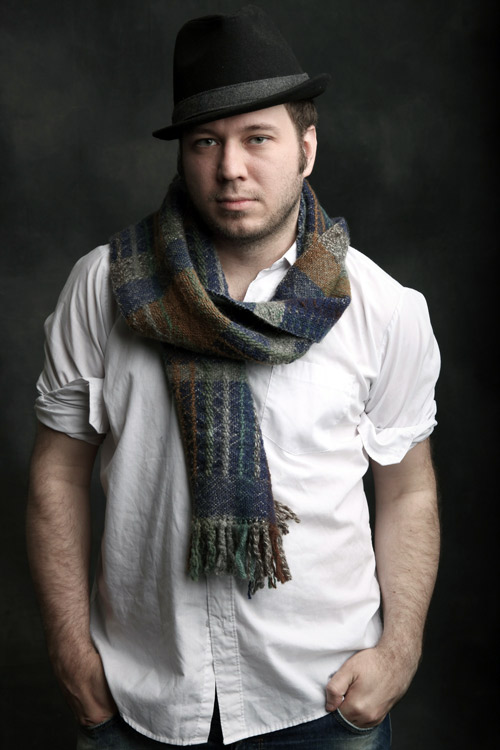Librettist Royce Vavrek is the Hot New Thing in opera. And even he’s not quite sure how that happened

WORD AND MUSIC | Royce Vavrek thought he would become a filmmaker, but his talent for structuring librettos for musicals and operas had led him to the performing arts.
ARNOLD WAYNE JONES | Executive Editor

While talking to a friend who makes his career in the opera field, I mentioned that I was about to interview Royce Vavrek, and asked my friend if they had ever met. “I’ve never met him,” he replied, “but he’s the hottest young librettist in the opera world.”
No pressure.
When I mention this to Vavrek during our telephone interview, I can hear in his voice a mix of pride and humility.
“I am working my ass off these days,” he admits, “but I’m working with a lot of people who are very inspiring and passionate — the compositional voices that are defining the 21st century. I’m lucky.”
It takes more than luck to have major premieres of new operas slated to open in the coming years — including his latest, Dog Days, which plays as part of the Fort Worth Opera Festival this weekend through May 10; it takes talent. And while Vavrek loved classical music and musical theater from an early age — “I was a boy soprano and took music lessons, and even wrote what I called a pop operetta at 14” — it didn’t really occur to him he would ever make a living at it. “There were so many clues [that I would work in the performing arts], but I thought I would be a filmmaker,” he says.
After college, though, his interest in theater blossomed. He attended the American Lyric Theater to learn about how to structure operas. “There I kind of understood that the kind of stories I love warranted operatic exploration. Opera just made itself apparent.”
Vavrek feels comfortable straddling both worlds: That of opera and of Broadway. And he’s not totally sure why there is often such a bright-line distinction between them.
“More and more, I’m trying to completely and utterly blur the line between opera and musical theater,” he says. “People who are involved in the Broadway tradition think opera is too high-brow, and opera lovers think Broadway is too ‘popular.’ It makes sense in marketing to say La Boheme is an opera and Rent is a musical. But some of the most amazing musicals [have the scope of opera]. Grey Gardens is an exemplary piece of musical theater. The ‘Soliloquy’ in Carousel — the entire Rodgers & Hammerstein canon, actually — is really sensational music, period.
Some of the most beautiful and sophisticated music ever written is in musicals. The main difference is that operas are usually classical music, and musicals are composed and intended as a popular vernacular. But more and more the exciting stuff [combines the disciplines].”
One of his latest collaborators, the composer Ricky Ian Gordon, composed the score for their work 27, about Gertrude Stein, which opened last year. “Ricky’s music is so wild and theatrical — it borrows from musical theater but it requires classical singers. But I also don’t know that 27 couldn’t exist on Broadway.
It’s perhaps not a surprise that Vavrek approaches his work with a sense of equanimity. (“I’m really quite new to the operatic world,” he admits.) He’s Canadian, after all (birthplace of Rafael “Ted” Cruz I point out with a laugh), and didn’t grow up being schooled in “right” and “wrong” kinds of culture.
“Classical music didn’t flood our house in rural Alberta,” he winks. “My parents, where they would have encountered classical music, was through film scores.” In the Vavrek home, “Kill Da Wabbit,” the theme from Jaws and “Takin’ Care of Business” were all on equal footing.
None of that is to say that Vavrek’s work is easily populist and lightweight. Indeed, Dog Days is a strange and apocalyptic work full of darkness and surrealism.
Its path to the stage was a long one. Dog Days’ composer, David T. Little, saw a weird short film on cable that burrowed into his brain. Several years later, Little was asked to participate in a young composers’ workshop and asked to “write something dramatic. He was given five singers with specific voice types. We had met early and thought he was a tremendous talent,” Vavrek says.
Little suggested they collaborate on adapting that film — about a man who scavenges for food by pretending to be a dog in a post-nuclear wasteland — for the stage. “We wrote like 22 minutes of material,” he says of the initial piece, which premiered in 2009. “That’s what planted the seed of this opera.” It arrives in North Texas as part of a mini-tour — the first collaboration between Vavrek and the Forth Worth Opera … but not the last. The FWO commissioned Vavrek and Little to create JFK, which will receive its world premiere at the 2016 festival.
An opera set the night before Kennedy’s assassination set in Texas that will also premiere here? Talk about pressure. But still exciting.
“JFK was one of the most exciting and wild and theatrical things I’ve had a hand in making,” Vavrek says. “It’s a huge, gargantuan challenge to tell a story about a man and woman who sleep — what is inherently dramatic about two people getting ready for the next day? It plays with dreams and this abstract theatricality. It’s gonna be a wild ride.”
This article appeared in the Dallas Voice print edition April 24, 2015.

